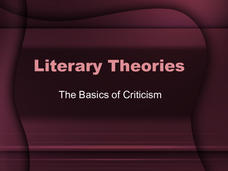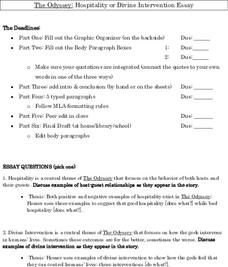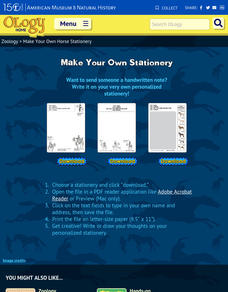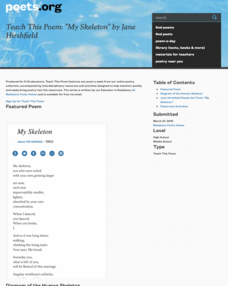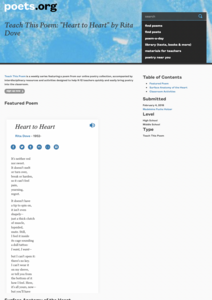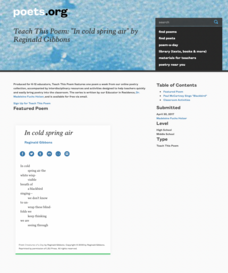Livaudais-Baker English Classroom
Literary Theories
Introduce ELA scholars to the basics of literary criticism with a 41-slide presentation that identifies eight different approaches to critical analysis. Each approach is defined, and advantages and disadvantages are listed. Also included...
Curated OER
The Odyssey: Hospitality or Divine Intervention Essay
Conclude a study of The Odyssey with a writing assignment that asks readers to investigate a central theme in Homer's tale. Scholars either provide positive and negative examples of hospitality or look for evidence of how the gods...
Curated OER
Creative God or Goddess
Who causes sinkholes? Or acid rain? High schoolers try their hand at myth-making as individuals create a god or goddess responsible for the modern-day phenomenon. They introduce their deity in an essay that reveals the name, parentage,...
Curated OER
The Odyssey: Narrative Writing
Help readers make a personal connection to Homer's The Odyssey with a narrative writing assignment. Scholars select one of three prompts and craft a first-person narrative rich in sensory details that describes an experience they had...
American Museum of Natural History
Make Your Own Horse Stationary
Write a letter on horse-themed stationery. Three pages to choose from showcase a variety of horses and the history of horseback riding.
Health Smart Virginia
What Is It Like to Be You?
Two poems, "What it is like to be you" and "I am more than what you see," provided young scholars an opportunity to reflect on how others see them versus how they see themselves. After reading the poems, individuals write their stories...
Health Smart Virginia
Effective Communication Skills
As part of a review of concepts taught in the Health Smart unit, individuals fill out a chart contrasting passive, assertive, and aggressive behaviors. They then practice their assertiveness skills by craft "I" messages and responses to...
Health Smart Virginia
TED Talk Reflection
Here's a worksheet that encourages listeners to pay close attention to a presentation and encourages them to reflect on what they have heard. Participants identify ideas that touched their emotions, new ideas, and ideas they found...
American Museum of Natural History
Make Your Own Astronomy Stationary
Scholars follow five steps to create personalized, astronomy-themed stationary.
Idaho Coalition
The Hunger Games: Gender Empowerment
The odds are in your favor that your pupils will love this lesson that uses The Hunger Games to launch a study of gender empowerment, as well as the influence of social constructs of gender. Groups discuss how Katniss Everdeen and Peeta...
PBS
Discuss 22-year-old Amanda Gorman’s inaugural poem “The Hill We Climb”
Two poems by National Youth Poet Laureate Amanda Gorman are spotlighted in a PBS lesson. Young scholars conduct a close reading and watch videos of Gorman reading her inaugural poem "The Hill We Climb" and "The Miracle of Morning." They...
Academy of American Poets
Teach This Poem: “As I Walk These Broad Majestic Days” by Walt Whitman
Walt Whitman's poem "As I Walk These Broad Majestic Days" offers scholars an opportunity to practice their noticing skills. They first examine a postcard of the Newport News Shipyard listing things they notice about the image and how...
Academy of American Poets
Teach This Poem: "Spring is like a perhaps hand" by E. E. Cummings
E. E. Cummings' "Spring is like a perhaps hand" offers young scholars an opportunity to try their hands at analyzing a simile. After a warm-up activity and a close reading of the poem, class members discuss what they think the poem is...
Academy of American Poets
Teach This Poem: "Putting in the Seed" by Robert Frost
Young botanists dig into a lesson that has them planting lima bean seeds and observing their growth. They compare their experience to that of the speaker in Robert Frost's poem, "Putting in the Seed."
Academy of American Poets
Teach This Poem: "The Shapes of Leaves" by Arthur Sze
Arthur Sze's poem, "The Shapes of Leaves," encourages young scholars to notice and speak for others who "do not speak." The activity begins with pupils writing about a tree that they really like. The class then examines an image of...
Academy of American Poets
Teach This Poem: "My Skeleton" by Jane Hirshfield
Jane Hirshfield's poem "My Skeleton" asks readers to pause and think about the amazing, often taken-for-granted structure that protects and gives form to human bodies. After observing the human skeleton's image, class members read the...
Academy of American Poets
Teach This Poem: "In the Next Galaxy" by Ruth Stone
Imagine what life might be like in a different galaxy. That's the challenge young scientists take on in a warm-up activity designed to prepare them for a close reading of Ruth Stone's poem "In the Next Galaxy." After class members share...
Academy of American Poets
Teach This Poem: "Heart to Heart" by Rita Dove
Take heart! Here's a lesson that will encourage learners to notice details. After listening to Sarah Vaughan singing "My Funny Valentine" and noting how the word heart relates to Valentine's Day, scholars observe a human heart image....
Academy of American Poets
Teach This Poem: "In cold spring air" by Reginald Gibbons
Reginald Gibbons' poem "In cold spring air" provides learners with a chance to develop their noticing skills. As a warm-up, class members watch Paul McCartney's video singing "Blackbird" and note words and phrases that stand out. They...
Academy of American Poets
Teach This Poem: “Dead Stars” by Ada Limón
Pay attention! A lesson featuring Ada Limon's poem "Dead Stars" is designed to help learners develop their noticing skills. Class members first study the constellation Orion's image and list what they notice and how the image makes them...
Academy of American Poets
Teach This Poem: "Maps" by Yesenia Montilla
After examining a physical map of the world, learners conduct a close reading of Yesenia Montilla's poem "Maps." They note the interesting words and phrases, the way the poem is structured, and list questions they might have. After...
Academy of American Poets
Teach This Poem: "Toward the Winter Solstice" by Timothy Steele
Timothy Steele's poem, "Toward the Winter Solstice," offers scholars an opportunity to consider what poets and scientists could learn from each other's work. First, learners examine a NASA image of a star-forming region in the Orion...
Academy of American Poets
Teach This Poem: "Black Laws" by Roger Reeves
After investigating the Black Lives Matter movement, class members do a close read of Roger Reeves' "Black Laws." They write down words and phrases that rhyme, consider the kinds of rhymes used and their function in the poem. Scholars...
Academy of American Poets
Teach This Poem: “In This Place (An American Lyric)” by Amanda Gorman
Amanda Gorman, the United States's first National Youth Poet Laureate, is featured in a resource from the Academy of American Poets. Class members first read Dr. Martin Luther King, Jr.'s "I Have A Dream" speech and note what King wanted...


